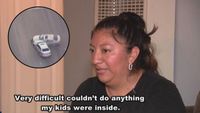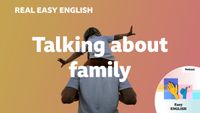Explore web search results related to this domain and discover relevant information.
Đối với chủ đề Talk About Your Family, đề bài thường sẽ yêu cầu thí sinh miêu tả về một thành viên trong gia đình hoặc những sự kiện đặc biệt của gia đình bạn. Bài viết sau đây sẽ giúp bạn trau dồi những (cụm) từ vựng cần thiết, ôn luyện các bố cục lý tưởng cho bài IELTS Speaking ...
Đối với chủ đề Talk About Your Family, đề bài thường sẽ yêu cầu thí sinh miêu tả về một thành viên trong gia đình hoặc những sự kiện đặc biệt của gia đình bạn. Bài viết sau đây sẽ giúp bạn trau dồi những (cụm) từ vựng cần thiết, ôn luyện các bố cục lý tưởng cho bài IELTS Speaking Part 1 & 2, và cung cấp những bài mẫu và các podcast về chủ đề Talk about your family được biên soạn chi tiết bởi TalkFirst tới các bạn!Nuclear family: Một gia đình hạt nhân chỉ đơn thuần là một cặp vợ chồng và con cái của họ, trái ngược với một đại gia đình ... The apple doesn’t fall far from the tree: Con nhà tông không giống lông cũng giống cánh. the apple of one’s eyes: người được cưng chiều, yêu mến · Video bài mẫu speaking chủ đề Talk about your family từ Oxford Online EnglishTrên đây là Bài mẫu band 5.0+, 6.5+, 8.0+ IELTS Speaking Part 2 – Chủ đề Talk About Your Your Family được biên soạn chi tiết bởi đội ngũ chuyên gia học thuật tại TalkFirst.Trong IELTS Speaking Part 1, Topic Family là một trong những topic giao tiếp đời thường hay gặp nhất, đặc biệt là hay đi cùng với topic talk about yourself.

A family’s dialect typically evolves through natural interactions, Gordon says, which also sets it apart from the insider lingo of other social groups that more deliberately curate their style of speaking. “With families, this tends to happen spontaneously,” she says.
She was involved in a study that included parents from four families, who carried digital audiotape recorders around with them for a week. The recordings allowed Gordon to hear the way the families conversed among themselves at the dinner table, in the car, while folding laundry or cooking dinner. She quickly realized that each family had certain distinct ways of speaking.I’m no longer certain of where my own faded memory ends and my father’s recollection begins, but he describes it this way: When I was a little girl – 4 or 5 years old – and did not want to be left alone in my room at bedtime, I would often slip out into the hallway and call to my parents downstairs.I always liked that this phrase stuck around, but it wasn’t until I became a parent myself that I fully grasped the power and poignancy of the language – often conceived by children – that becomes fundamental within a family’s lexicon. As a 15-month-old, my daughter would point in awe at the moon and declare it “moot,” the vowel elongated and the t emphatic.Most families have their own version of this, an intimate, group-specific dialect known among linguistic experts as “familylect” or “familect.” Cynthia Gordon, a professor in the linguistics department at Georgetown University and the author of “Making Meanings, Creating Family,” has spent much of her career studying this type of family discourse.

Your immediate family (sometimes called your nuclear family) are your close relatives, or family members. In the U.S.—as in many English-speaking regions—this typically includes:
Your extended family are relatives beyond your immediate family. This includes the family members below: In the U.S.—as in many English-speaking regions—this typically includes:From moms to cousins to in-laws, meet the English words for your family tree!You probably know some English family words, but you’re bound to run into a few surprises! Here are the most important English words for family members.There are all kinds of families in the world: big, small, close-knit, and distant.
Sam wants to play Game of Kings, but Jack is more interested in Sam's family. Do the preparation exercise first. Then watch the video and follow the instructions to practise your speaking.
Sam: Er, he’s five years older than me, so he’s twenty-three. Jack: Cool. And do you see him often? Sam: Not very often ... I’ve been to visit him twice. Well, three times, but the first time I don’t remember because I was really little. But we speak on Skype a lot.Sam: Er, he’s five y____ older t___ me, so h__ twenty-three. Jack: Cool. And do you see him often? Sam: Not very often ... I’ve b___ t__ visit him twice. Well, three times, but the first time I d___ remember because I w__ really little. But we speak on Skype a lot.

Improve your English speaking FAST by practicing daily English conversation by topic. Take advantage of your short free time during the day to do a lot of repetition, and you will be amazed at how fast your English speaking improves
I’m the second child in my family. ... My father likes playing football and my mother likes cooking. ... Of course not. They always ask me to get home before 10 pm each night. ... Right now, no, but I used to. ... Yes, we do. My mom always prepares delicious meals for us. Daily English Conversation Practice by Topic – Lesson List · Listening is THE KEY to better English speaking.Remember, DEEP LEARNING is the No. 1 secret to English fluency. If you want to speak English fluently and automatically, you have to repeat the same lesson over and over again until you MASTER it.There are 5 people in my family: my father, mother, brother, sister, and me.
For access to the latest Speak/e/s Family Genealogies, Bulletins, Resources, Historic A. Howard Correspondence and Obituaries.
Speak/e/s family visits St.Lord Clitherow, patron of St. Leonard' at Downham, speaks to the Speak/e/s family at the church.

TalkingParents is the best co-parenting software to share a custody calendar, manage child support payments, message, call, and more. View our features list.
What inspires this family-language invention? In general, sufficient time logged together and shared experiences as a unit. Children are frequently the architects of new words, especially while they’re learning to speak. As kids fumble and play with sounds and meaning, their cutesy word ...
What inspires this family-language invention? In general, sufficient time logged together and shared experiences as a unit. Children are frequently the architects of new words, especially while they’re learning to speak. As kids fumble and play with sounds and meaning, their cutesy word experiments can be picked up by the whole family, sometimes to be passed on between generations as verbal heirlooms of sorts.“Any group of people that has extended contact over time and sees itself as distinctive is going to have some specialized uses of language,” Gordon told me. “Listening to recordings of other families is like being immersed in a different world.” ... We speak differently in different settings—this is no surprise—depending on whom we’re talking to and what the purpose is.When people share a space, their collective experience can sprout its own vocabulary, known as a familect.When people share a space, their collective experience can sprout its own vocabulary, known as a "familect."


In this episode of Speaking Spanish for Beginners Podcast, you’ll learn the most common vocabulary for family members in Spanish.
Learn Spanish vocabulary for family members with examples, dialogue, and practice. Perfect for beginners starting en español.Not sure how to ask for or give your phone number in Spanish? This episode of the Speaking Spanish for Beginners podcast has you covered!Start speaking Spanish with confidence!In Spanish, family is la familia.
The Foundations program supports families looking for quality child care. We are not a child care provider, but we can connect you with the resources you need to get started. Please call us at 719.205.2691 or visit the Finding Quality Child Care page.
The Foundations program supports families looking for quality child care. We are not a child care provider, but we can connect you with the resources you need to get started. Please call us at 719.205.2691 or visit the Finding Quality Child Care page.The Foundations Team at Joint Initiatives for Youth + Families is your local early childhood liaison, dedicated to supporting ALL early childhood programs and professionals in building strong early childhood foundations for children and families. We provide support based on needs and individual starting points – almost always at no cost.The Foundations program can help early care and education programs and family child care providers with both aspects of Colorado Shines. Whether it’s the Quality Rating Improvement System (QRIS) or the Professional Development Information System (PDIS), we are here to assist you!Foundations will serve as a vehicle that brings together agencies and individuals to work collaboratively on a seamless system of care for young children and their families in El Paso County.

In most languages, the first word children learn is ‘Mum’. Family is so important for most of us that it’s the first thing we learn to speak about. There’s more to s
In most languages, the first word children learn is ‘Mum’. Family is so important for most of us that it’s the first thing we learn to speak about. There’s more to speaking about family in English than just ‘Mum’ and ‘Dad’, though.In different cultures around the world and even within cultures, there are different types of families. A nuclear family is a small family – usually just a mother, father and kids. In some places people live with their extended family, which includes more relatives from other generations or parts of the family.A close family can refer to a family where all the members have a good relationship with each other. It can also refer to the family members you see most – your parents (mother and father), siblings (brothers and sisters), and your children.For some people’s close family includes a stepparent (someone married to your mother or father who is not your genetic mother or father) or a stepbrother or stepsister (the child of a stepparent and another person who is not genetically-related to you.
)

The mother of three young kids who were involved in a carjacking, kidnapping, and pursuit spoke to FOX 11 about the horrific incident and what led up to it.
LOS ANGELES - Three young children were injured after a man carjacked the family car they were in, taking them on a dangerous high-speed pursuit that ended in a violent crash. One of the young kids involved in the pursuit spoke exclusively to FOX 11 about the entire incident.A man managed to jump into the driver's seat, hitting the father as he sped away in the mother's car with the three kids inside. The mother heard her kids yelling and ran outside to save them. The father and uncle tried to stop the suspect, but it was too late. He carjacked their family car and kidnapped their three kids.The family said the middle child undid his seatbelt, attempting to get out of the car. But since his seatbelt was removed, he sustained severe injuries. All three kids and their father have been released from the hospital and are recovering at home.The family said three young kids were in their mother's car when a man jumped in and stole the vehicle.

Surrounded by relatives, the children involved in Friday’s dangerous pursuit through Los Angeles have been released from the hospital and are able to go home, their family told KTLA. The youngest, age 2, was discharged Saturday, while the older two children, ages 7 and 9, were released Sunday ...
Surrounded by relatives, the children involved in Friday’s dangerous pursuit through Los Angeles have been released from the hospital and are able to go home, their family told KTLA. The youngest, age 2, was discharged Saturday, while the older two children, ages 7 and 9, were released Sunday evening.Surrounded by relatives, the children involved in Friday’s dangerous pursuit through Los Angeles have been released from the hospital and are able to go home, their family told KTLA. The youngest, …All three children were taken to the hospital with non-life-threatening injuries, according to LASD. The family said the 7-year-old sustained a serious leg injury and will need ongoing care, but the children are now able to go home.Speaking in Spanish, the children’s mother said the moment keeps replaying in her mind: “You see someone in a black hoodie get in the car and drive off.”
Some families do this around birthdays, during holiday visits, or at the start of the new year. The setting doesn’t matter as much as the intention: creating clarity and connection. ... Speak plainly. Skip the jargon.
Talking to your family about your wealth and retirement plans may feel uncomfortable, but it's an important part of your planning process.Retirement planning isn’t just financial—it’s deeply personal. Maybe you want to stay in your home as long as possible. Maybe you’re open to downsizing or relocating. Maybe the idea of moving in with family is a no-go.Talking to your family about your retirement plans doesn't need to be awkward.Let’s face it—talking about money with family isn’t anyone’s idea of a fun night in.
Please check out my ultimate guide on how to talk about your family in English. Perfect for English learners and English teachers.
Talking about your family should be one of the easiest things to do in English.These people are your family, so you should know them very well.Talking about your family for over five minutes should be no problem for you.Just follow all the steps below and you will find that you can talk about your family for several minutes.


A family’s dialect typically evolves through natural interactions, Gordon says, which also sets it apart from the insider lingo of other social groups that more deliberately curate their style of speaking. “With families, this tends to happen spontaneously,” she says.
She was involved in a study that included parents from four families, who carried digital audiotape recorders around with them for a week. The recordings allowed Gordon to hear the way the families conversed among themselves at the dinner table, in the car, while folding laundry or cooking dinner. She quickly realized that each family had certain distinct ways of speaking.Most families have their own version of this, an intimate, group-specific dialect known among linguistic experts as “familylect” or “familect. ”'The Queer Arab Glossary' is a bold and beautifully illustrated archive of queer language in the Arab world. Author Marwan Kaabour speaks to Carl Collison about reclaiming cultural…I always liked that this phrase stuck around, but it wasn’t until I became a parent myself that I fully grasped the power and poignancy of the language - often conceived by children - that becomes fundamental within a family’s lexicon. As a 15-month-old, my daughter would point in awe at the moon and declare it “moot,” the vowel elongated and the t emphatic.
A wide range of vocabulary, expressions, idioms and collocations to help you talk confidently about the IELTS Speaking topic of family.
Probably more with my family, I think blood is thicker than water ... Join Today! If you liked this lesson, leave a comment below! There are more lessons you can follow in the links below too. ENVIRONMENT in IELTS Speaking.Knowing how to talk confidently about family in IELTS Speaking is essential, because it is such a common topic.In this IELTS Speaking lesson on the topic of Family, you will learn how to talk about your family and the activities you do with your family.Here are some ideas and language to answer this question about family in IELTS Speaking.

Want to learn how to speak about family and relatives in English? Check out these vocabulary terms and phrases.
So today we will learn – and for some, it will be a review – helpful words and phrases about family and relatives: immediate family, extended family, and more. I’ll also give you some sample sentences which you can adjust and use when speaking about your own family and relatives.In a recent lesson, a Preply student expanded their family relationship vocabulary through targeted practice exercises, learning terms like "niece," "in-laws," and "step-siblings." They demonstrated understanding by using these terms accurately in guided speaking activities.This insight is based on a real learning experience at Preply. Start speaking confidently today ... I come from a small/big family.In most countries, the nuclear family is a central part of life, and having the vocabulary to speak about it is a central part of language learning.


And though it might just sound like a family being silly, building a familect can have emotional benefits for kids and adults. “When people speak the same language, it creates a sense of family and unity,” says Deborah Tannen, a professor at Georgetown University and author of You Just ...
And though it might just sound like a family being silly, building a familect can have emotional benefits for kids and adults. “When people speak the same language, it creates a sense of family and unity,” says Deborah Tannen, a professor at Georgetown University and author of You Just Don’t Understand.She adds that in families with a bilingual parent, familect can help maintain a little bit of linguistic heritage. Martinez’s kids may not speak Spanish fluently, for example, but they still have access to some of their father’s culture and language through their family dialect.‘That whoa-whoa is chasing the hodgie!’ Your household’s familect can strengthen bonds and develop language skills.Because they’re typically confined to the private sphere, familects haven’t been studied as thoroughly as languages associated with other tight-knit groups—like dialects spoken in a geographic region or sociolects known among members of the same social group.

Learn to talk about your family and some useful words to compare them. ... Neil Welcome to Real easy English from BBC Learning English. Beth In this programme, we have real conversations in easy English to help you practise listening and learn new words and phrases. I'm Beth. Neil And I'm Neil. In each episode, we talk in English about a different topic that you need for everyday speaking...
Beth OK, yeah. I think my family is definitely smaller than yours because I don't have any brothers or sisters. I am an only child. So, when I get together with my family it's very small because I also only have one cousin and she's an only child as well.Beth Well, today's episode is all about family. We’ll be talking about who is in our families and comparing them.Neil OK, great. So, what do we mean when we say comparing our families, Beth?So my family's tiny!






